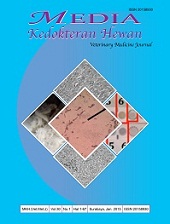Detection of Cryptosporidium spp. in Wild Rats (Rattus spp.) in Surabaya, East Java
Downloads
Cryptosporidiosis is a waterborne zoonosis caused by Cryptosporidium, which is a parasite that causes infection of the small intestine and leads to acute diarrhea in both humans and animals. Wild rats (Rattus spp.) are known to carry many zoonotic pathogens including Cryptosporidium. Given their close proximity to humans in urban environments, the likelihood of disease transmission is high. This study aims to detect the Cryptosporidium spp. infection in wild rats in Surabaya City, East Java Province. Intestinal fecal samples were collected using necropsy. The flotation test and Ziehl-Neelsen stain were used to observe the presence of Cryptosporidium under the microscope. The results showed that 69 samples were positive for Cryptosporidium spp. in the oocyst stage, which appeared dark pink with a clear cavity and the size of the oocysts ranged from 2-6 μm. The high incidence of cryptosporidiosis in wild rats is a potential health threat to both animals and humans.
Bahrami, F, Sadraei J, and Frozandeh M. 2012. Molecular Characterization of Cryptosporidium spp. in Wild Rats of Tehran, Iran Using 18s rRNA Gene and PCR_RFLP Method. Jundishapur J Microbiol.5(3):486–490
Bouzid, M, Kintz E, and Hunter P. 2018. Risk factors for Cryptosporidium infection in low and middle income countries: A systematic review and meta-analysis. PLoS Neglected Trop Dis.12(6):1-13
Dixon, B, Parrington L, Cook A, Pintar K, Pollari F, Kelton D, and Farber J. 2011. The potential for zoonotic transmission of Giardia duodenalis and Cryptosporidium spp. from beef and dairy cattle in Ontario, Canada. VetParasitol. 175(1–2):6-20.
Gerace, Elisabetta, Marco V, and Biondo C. 2019. Cryptosporidium Infection: Epidemiology, Pathogenesis, and Differential Diagnosis. European Journal of Microbiology and Immunology. 9:1-5.
Ghazy, A, Abdel S, and Shaapan R. 2015. Cryptosporidiosis in Animals and Man: 1. Taxonomic Classification, Life Cycle, Epidemiology and Zoonotic Importance. Asian Journal of Epidemiology. 8:48-63.
Hamed, W, Yousef N, Mazrou Y, Elkholy W, El-Refaiy A, Elfeky F, Albadrani M, El-Tokhy A, and Abdelaal K. 2021. Anticryptosporidium Efficacy of Olea europaea and Ficus carica Leaves Extract in Immunocompromised Rat Associated with Biochemical Characters and Antioxidative System. Cells. 10.
Kimura, A, Edagawa A, Okada K, Takimoto A, Yonesho S, and Karanis P. 2007. Detection and genotyping of Cryptosporidium from brown rats (Rattus norvegicus) captured in an urban area of Japan. Parasitol Res.100:1417–1420.
Koehler, A, Wang T, Haydon S, and Gasser R. 2018. Cryptosporidium viatorum from the native Australian swamp rat Rattus lutreolus - an emerging zoonotic pathogen? Int. J. Parasitol. Parasites. Wildl. 7:18–26.
Livia, G, Fernández Á, Feliu C, Miquel J, Quilichini Y, and Foronda P. 2021. Cryptosporidium spp. in wild murids (Rodentia) from Corsica, France. Parasitology Research. 121:345-354.
Martin, W and Aitken I, 2000. Diseases of Sheep. 3rd Edn., Blackwell Science Ltd., UK.,pp: 153-159
Meerburg, B, Singleton G, and Kijlstra A. 2009. Rodent-borne diseases and their risks for public health. Crit. Rev. Microbiol. 35:221–270.
Mufa, R, Nunuk D, Fedik A, Lucia T, Endang S, Didik H, dan Mufasirin. 2020. Deteksi Cryptosporidium canis pada Anjing di Kota Surabaya. Jurnal Veteriner 21(2) : 176-182.
Rekha, K, Puttalakshmamma G, and D'Souza P. 2016. Comparison of different diagnostic techniques for the detection of cryptosporidiosis in bovines. Veterinary world. 9. 211-215.
Roy, S, DeLong S, Stenzel S, Shiferaw B, Roberts J, Khalakdina A, Marcus R, Segler S, Shah D, Thomas S, Vugia D, Zansky S, Dietz V, Beach M. 2004. Risk Factor for Sporadic Cryptosporidiosis among Immunocompetent Persons in the United States from 1999 to 2001. J Clin Microbiol. 42(7): 2944-51.
Smith, H, Caccio S, Cook N, Nichols R and Tait A , 2007. Cryptosporidium andGiardia as foodborne zoonoses. Vet Parasitol. 149: 29-40.
Tahvildar, B. and Salehi N. 2014. Detection of Cryptosporidium infection by modified ziehl-neelsen and PCR methods in children with diarrheal samples in pediatric hospitals in Tehran. Gastroenterol Hepatol Bed Bench. Spring. 7(2):125-30.
WHO (World Health Organization). 2006. Guidelines for Drinking Water Quality. Cryptosporidiosis. Microbiol Environ Health. 9-119.
Wijayanti T. 2017. Cryptosporidiosis in Indonesia. Balaba. 13(01):73-82.
Zahedi, A, Bolland S, Oskam C, and Ryan U. 2021. Cryptosporidium abrahamseni n. sp. (Apicomplexa: Cryptosporidiiae) from red-eye tetra (Moenkhausia sanctaefilomenae). Experimental parasitology, 223.2021 .108089
Zhao, Z, Wang R, Zhao W, Qi M, Zhao J, Zhang L, Li J, and Liu A. 2015. Genotyping and subtyping of Giardia and Cryptosporidium isolates from commensal rodents in China. Cambridge Univ Press.142(6):800–806.
Zhao, W, Zhou H, Huang Y, Xu L, Rao L, Wang S, Wang W, Yi Y, Zhou X, Wu Y, Ma T, Wang G, Hu X, Peng R, Yin F, and Lu G. 2019. Cryptosporidium spp. in wild rats (Rattus spp.) from the Hainan Province, China: Molecular detection, species/genotype identification and implications for public health. International journal for parasitology. Parasites and wildlife. 9:317–321.
Copyright (c) 2024 Ponasari Galuh Pratama, Endang Suprihati, Lucia Tri Suwanti, Mufasirin, Poedji Hastutiek, Boedi Setiawan, Heni Puspitasari, Elly Nur Indasari

This work is licensed under a Creative Commons Attribution-ShareAlike 4.0 International License.

Veterinary Medicine Journal by Unair is licensed under a Creative Commons Attribution-ShareAlike 4.0 International License.
1. The Journal allows the author to hold the copyright of the article without restrictions.
2. The Journal allows the author(s) to retain publishing rights without restrictions
3. The legal formal aspect of journal publication accessibility refers to Creative Commons Attribution Share-Alike (CC BY-SA).





11.jpg)







11.png)













